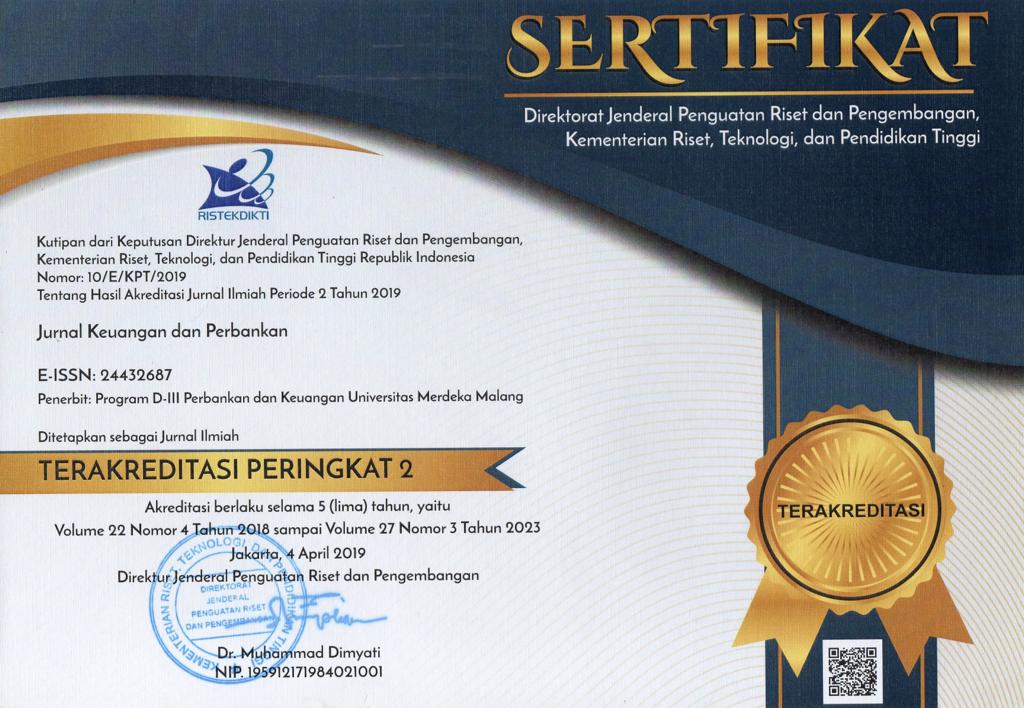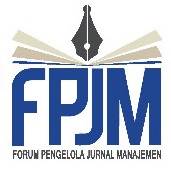Intellectual capital performance of Sharia banks: Evidence from Indonesia
Abstract
Towards a sustainable Islamic banking industry must be attended by the sharia governance of capital allocation. In addition, Islamic banking requires a higher level of intellectual ability, especially intellectual capital in humans to support product innovation. The aims of this paper is to examine effect of corporate governance, family ownership structure, foreign ownership structure, and digital banking on Intellectual Capital (IC) Performance in Indonesian Islamic banks. Testing and analysis uses Least Square Panel data regression with panel data and a total of 93 observations in period 1999-2016. In this research, IC performance used Islamic Banking Value Added Intellectual Coefficient (IBVAIC). We present empirical evidence that corporate governance had significant implications for improving IC performance. In addition, digital banking negatively influences IC performance. In contrast, family ownership, foreign ownership, liquidity and age did not affect IC performance. This study to contribute literature to the IC performance in sharia banking in the form of a Sharia Business Entity.
JEL Classification: G31, G32, G34
Keywords
Full Text:
PDFReferences
Rashid, A. A., Ibrahim, M. K., Othman, R., & See, K. F. (2012). IC disclosures in IPO prospectuses: Evidence from Malaysia. Journal of Intellectual Capital, 13(1), 57-80. https://doi.org/10.1108/14691931211196213
Acharya, R. N., Kagan, A., & Lingam, S. R. (2008). Online banking applications and community bank performance. International Journal of Bank Marketing, 26(6), 418-439. https://doi.org/10.1108/02652320810902442
Al-Musali, M. A. K., & Ismail, K. N. I. K. (2014). Intellectual capital and its effect on financial performance of banks: Evidence from Saudi Arabia. Procedia-Social and Behavioral Sciences, 164, 201-207. https://doi.org/10.1016/j.sbspro.2014.11.068
Al-Smadi, M. O., & Al-Wabel, S. A. (2011). The impact of e-banking on the performance of Jordanian banks. Journal of Internet Banking and Commerce, 16(2), 1-10.
Anthony, R. D., & Widagdo, A. K. (2013). Pengaruh family control terhadap intellectual capital performance. Jurnal Bisnis dan Ekonomi, 4(2), 122-136.
Appuhami, R., & Bhuyan, M. (2015). Examining the influence of corporate governance on intellectual capital efficiency: Evidence from top service firms in Australia. Managerial Auditing Journal, 30(4/5), 347-372. https://doi.org/10.1108/MAJ-04-2014-1022
Azzama, I., Fouad, J., & Ghosch, D. K. (2013). Foreign ownership and financial performance: Evidence from Egypt. International Journal of Business, 18(3), 232-254.
Beck, T., Demirgüç-Kunt, A., & Merrouche, O. (2013). Islamic vs. conventional banking: Business model, efficiency and stability. Journal of Banking & Finance, 37(2), 433-447. https://doi.org/10.1016/j.jbankfin.2012.09.016
Bonin, J. P., Hasan, I., & Wachtel, P. (2005). Bank performance, efficiency, and ownership in transition countries. Journal of banking & finance, 29(1), 31-53. https://doi.org/10.1016/j.jbankfin.2004.06.015
Brennan, N. M., & Solomon, J. (2008). Corporate governance, accountability, and mechanisms of accountability: an overview. Accounting, Auditing & Accountability Journal, 21(7), 885-906.
Brinker, B. (2000). Intellectual capital: tomorrow’s asset, today’s challenge. International Journal of Learning and Intellectual Capital, 8(3), 285-289.
Cerbioni, F., & Parbonetti, A. (2007). Exploring the effects of corporate governance on intellectual capital disclosure: an analysis of European biotechnology companies. European Accounting Review, 16(4), 791-826.
Chen, M. C., Cheng, S. J., & Hwang, Y. (2005). An empirical investigation of the relationship between intellectual capital and firms’ market value and financial performance. Journal of intellectual capital, 6(2), 159-176.
Cheung, Y. L., Rau, P. R., & Stouraitis, A. (2006). Tunneling, propping, and expropriation: evidence from connected party transactions in Hong Kong. Journal of Financial Economics, 82(2), 343-386. https://doi.org/10.1016/j.jfineco.2004.08.012
Cisco. (2014). Annual Security Report. United States Securities and Exchange Commission. Washington D. C.
Claessens, S., Djankov, S., Fan, J. P., & Lang, L. H. (2002). Disentangling the incentive and entrenchment effects of large shareholdings. The journal of finance, 57(6), 2741-2771. https://doi.org/10.1111/1540-6261.00511
Cohen, S., & Lauterbach, B. (2008). Differences in pay between owner and non-owner CEOs: Evidence from Israel. Journal of Multinational Financial Management, 18(1), 4-15. https://doi.org/10.1016/j.mulfin.2007.02.005
Cucculelli, M., & Micucci, G. (2008). Family succession and firm performance: Evidence from Italian family firms. Journal of Corporate Finance, 14(1), 17-31. https://doi.org/10.1016/j.jcorpfin.2007.11.001
Curado, C., Guedes, M. J., & Bontis, N. (2014). The financial crisis of banks (before, during and after): an intellectual capital perspective. Knowledge and Process Management, 21(2), 103-111. https://doi.org/10.1002/kpm.1434
Dahlquist, M., & Robertsson, G. (2001). Direct foreign ownership, institutional investors, and firm characteristics. Journal of financial economics, 59(3), 413-440. https://doi.org/10.1016/s0304-405x(00)00092-1
Dzenopoljac, V., Yaacoub, C., Elkanj, N., & Bontis, N. (2017). Impact of intellectual capital on corporate performance: evidence from the Arab region. Journal of Intellectual Capital, 18(4), 884-903. https://doi.org/10.1108/jic-01-2017-0014
El-Bannany, M. (2008). A study of determinants of intellectual capital performance in banks: the UK case. Journal of intellectual capital, 9(3), 487-498. https://doi.org/10.1108/14691930810892045
Forte, W., Tucker, J., Matonti, G., Nicolò, G., & Nicolò, G. (2017). Measuring the intellectual capital of Italian listed companies measuring the intellectual capital of Italian listed companies. Journal of Intellectual Capital, 18(4), 710-732 https://doi.org/10.1108/JIC-08-2016-0083
Ghosh, S., & Mondal, A. (2009). Indian software and pharmaceutical sector IC and financial performance. Journal of Intellectual Capital, 10(3), 369-388.
Haniffa, R. M., & Cooke, T. E. (2002). Culture, corporate governance, and disclosure in Malaysian corporations. Abacus, 38(3), 317-349. https://doi.org/10.1111/1467-6281.00112
Hermans, R., & Kauranen, I. (2005). Value creation potential of intellectual capital in biotechnology–empirical evidence from Finland. R&D Management, 35(2), 171-185. https://doi.org/10.1111/j.1467-9310.2005.00381.x
Hermawan, A. A., & Dina, A. R. A. (2012). The effect of bank monitoring as an alternative of corporate governance mechanism on the borrowers’ firm value: Evidence from Indonesian listed firms. Risk Governance and Control: Financial Markets & Institutions, 2(4), 73-83. https://doi.org/10.22495/rgcv2i4art6
Hsu, L. C., & Wang, C. H. (2012). Clarifying the effect of intellectual capital on performance: The mediating role of dynamic capability. British Journal of Management, 23(2), 179-205. https://doi.org/10.1111/j.1467-8551.2010.00718.x
Keenan, J., & Aggestam, M. (2001). Corporate governance and intellectual capital: some conceptualisations. Corporate Governance: An International Review, 9(4), 259-275. https://doi.org/10.1111/1467-8683.00254
Kellermanns, F. W., & Eddleston, K. A. (2007). A family perspective on when conflict benefits family firm performance. Journal of Business Research, 60(10), 1048-1057. https://doi.org/10.1016/j.jbusres.2006.12.018
Kubo, I., & Saka, A. (2002). An inquiry into the motivations of knowledge workers in the Japanese financial industry. Journal of Knowledge Management, 6(3), 262-271. https://doi.org/10.1108/13673270210434368
Lensink, R., & Naaborg, I. (2007). Does foreign ownership foster bank performance?. Applied Financial Economics, 17(11), 881-885. https://doi.org/10.1080/09603100600827653
Lindemanis, M., Loze, A., & Pajuste, A. (2019). The effect of domestic to foreign ownership change on firm performance in Europe. International Review of Financial Analysis. (In Press). https://doi.org/10.1016/j.irfa.2019.04.004
Makki, M. A. M., & Lodhi, S. A. (2014). Impact of Corporate Governance on Intellectual Capital Efficiency and Financial Performance. Pakistan Journal of Commerce & Social Sciences, 8(2), 305- 330.
Mention, A. L., & Bontis, N. (2013). Intellectual capital and performance within the banking sector of Luxembourg and Belgium. Journal of Intellectual capital, 14(2), 286-309. https://doi.org/10.1108/14691931311323896
Morck, R., Shleifer, A., & Vishny, R. W. (1988). Management ownership and market valuation: An empirical analysis. Journal of Financial Economics, 20(1-2), 293-315. https://doi.org/10.1016/0304-405x(88)90048-7
Murthy, V., & Mouritsen, J. (2011). The performance of intellectual capital: Mobilising relationships between intellectual and financial capital in a bank. Accounting, Auditing & Accountability Journal, 24(5), 622-646. https://doi.org/10.1108/09513571111139120
Nimtrakoon, S. (2015). The relationship between intellectual capital, firms’ market value and financial performance: Empirical evidence from the ASEAN. Journal of Intellectual Capital, 16(3), 587-618. https://doi.org/10.1108/jic-09-2014-0104
Safieddine, A. (2009). Islamic financial institutions and corporate governance: new insights for agency theory. Corporate Governance: An International Review, 17(2), 142-158. https://doi.org/10.1111/j.1467-8683.2009.00729.x
Shahveisi, F., Khairollahi, F., & Alipour, M. (2017). Does ownership structure matter for corporate intellectual capital performance? An empirical test in the Iranian context. Eurasian Business Review, 7(1), 67-91. https://doi.org/10.1007/s40821-016-0050-8
Saleh, N. M., Rahman, M. R. C. A., & Hassan, M. S. (2009). Ownership structure and intellectual capital performance in Malaysia. Asian Academy of Management Journal of Accounting and Finance, 5(1), 1-29.
Ting, I. W. K., Kweh, Q. L., Lean, H. H., Ng, J. H. (2016). Ownership Structure and Firm Performance: The Role of R&D. Institutions and Economies, 8(4), 1-21
Tjendani, R. D., Widagdo, A. K., & Muthmainah, M. (2018). Digital banking, corporate governance, ownership structure, and intellectual capital performance: Evidence from Indonesia. Jurnal Keuangan dan Perbankan, 22(4), 714-733. https://doi.org/10.26905/jkdp.v22i4.2481
Tseng, C-Y., & Goo, Y-J. J. (2005). Intellectual capital and corporate value in an emerging economy: Empirical study of Taiwanese manufacturers. R & D Management, 35(2), 187-201. https://doi.org/10.1111/j.1467-9310.2005.00382.x
Ulum, I. (2013). iB-VAIC: Model pengukuran kinerja intellectual capital perbankan Syariah di Indonesia. Jurnal Inferensi, 7(1), 185-206. https://doi.org/10.18326/infsl3.v7i1.185-206
Villalonga, B., & Amit, R. (2006). How do family ownership, control, and management affect firm value? Journal of Financial Economics, 80(2), 385-417. https://doi.org/10.1016/j.jfineco.2004.12.005
Wahid, A. H. D. A., Abu, N. A., Latif, W. A., & Smith, M. (2013). Corporate governance and intellectual capital: Evidence from public and private universities. Higher education studies, 3(1), 63-78. https://doi.org/10.5539/hes.v3n1p63
Widarjo, W., & Bandi (2018). Determinants of intellectual capital disclosure in the IPOs and its impact on underpricing: Evidence from Indonesia. International Journal of Learning and Intellectual Capital, 15(1), 1–19. https://doi.org/10.1504/ijlic.2018.088346
DOI: https://doi.org/10.26905/jkdp.v23i4.3563
Refbacks
- There are currently no refbacks.
Jurnal Keuangan dan Perbankan (Journal of Finance and Banking)
Diploma Program of Banking and Finance, Faculty of Economics and Business, University of Merdeka Malang
Published by University of Merdeka Malang
Mailing Address:
2nd floor Finance and Banking Building, Jl. Terusan Raya Dieng No. 57 Malang, East Java, Indonesia
Phone: +62 813-3180-1534
Email: jkp@unmer.ac.id
 This work is licensed under a Creative
This work is licensed under a Creative
Commons Attribution-ShareAlike 4.0




